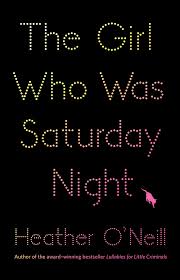



 Us Conductors won the Giller Prize last year. The Giller Prize is a literary award instrumental in encouraging and supporting Canadian authors. Many Canadians watch this prize for the winner, but also (as with most prizes) pay close attention to the shortlist. One of the books on the shortlist was The Girl who Was Saturday Night. The French Canadian setting caught my eye because I have a friend who is a French teacher and an avid reader of literary novels. She got it for Christmas and I’ve asked her if I may share what she said about it. Thanks Alice!
Us Conductors won the Giller Prize last year. The Giller Prize is a literary award instrumental in encouraging and supporting Canadian authors. Many Canadians watch this prize for the winner, but also (as with most prizes) pay close attention to the shortlist. One of the books on the shortlist was The Girl who Was Saturday Night. The French Canadian setting caught my eye because I have a friend who is a French teacher and an avid reader of literary novels. She got it for Christmas and I’ve asked her if I may share what she said about it. Thanks Alice!
Heather O’Neill, the author of Lullabies for Little Criminals (2007 winner of Canada Reads and numerous other awards including the Orange Prize) is from Montreal. The book is about “gorgeous twins Noushcka and Nicolas Tremblay who live with their grandfather Loulou in a tiny, sordid apartment on St. Laurent Boulevard. They are hopelessly promiscuous, wildly funny and infectiously charming. They are also the only children of the legendary Québécois folksinger Étienne Tremblay, who was as famous for his brilliant lyrics about working-class life as he was for his philandering bon vivant lifestyle and his fall from grace. Known by the public since they were children as Little Noushcka and Little Nicolas, the two inseparable siblings have never been allowed to be ordinary” (Amazon).
Guest Post by Alice Vanderkooy:
It is a beautiful read and a wonderful testimony to the importance of being nurtured, as well as the incredible resilience of those who grow up with dysfunction, the pull of staying with what is familiar even if it’s obviously not good for you, and the strength it requires to unhitch oneself from such a past. The ending will stay with me for a long time. I think it is a book I will probably re-read at some point.
It took a bit of time and at the beginning I found it bizarre, until the characters grew on me, and I could see beyond the “outer” to the inner. The book is strongly connected to Quebec and the ethos of the 80’s, as well as the impact of the years previous to that. I would wonder how those who have no connection to Quebec history and culture would respond to the book. If nothing else they would miss the significance of some of the references.

